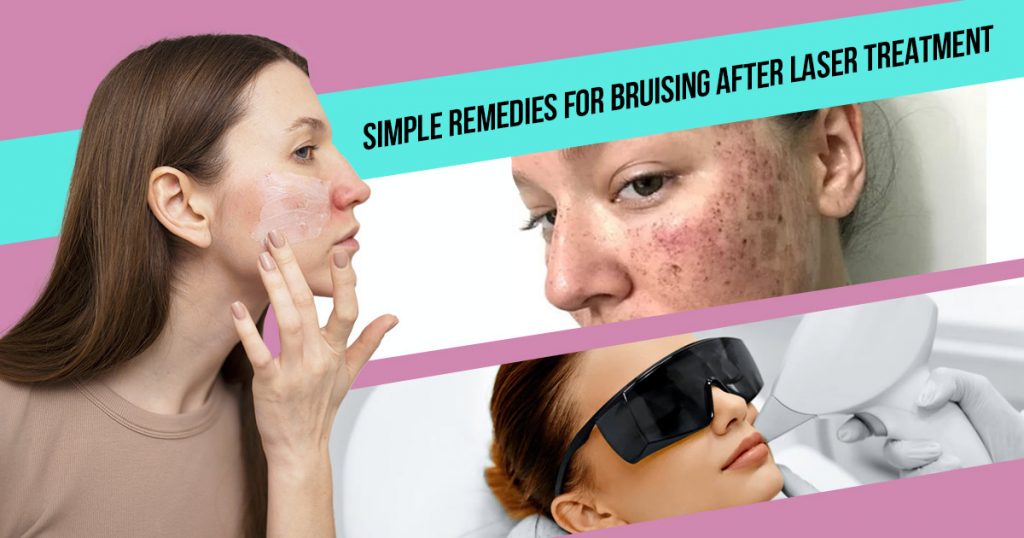Bruising from laser treatment on the face or body occurs when small blood vessels under the skin break due to the laser’s heat. This is more common in individuals with sensitive skin or those prone to bruising. While the discoloration may look alarming, it typically fades within a few days to two weeks.
Laser treatments for rosacea and hair removal can lead to bruising due to their impact on blood vessels. Pulsed-dye lasers and YAG lasers, often used for rosacea, target visible blood vessels, which may cause temporary redness or mild bruising. Similarly, laser hair removal can lead to minor bruising if the skin reacts to the heat.
Other Treatments That Could Also Cause Bruising
While laser treatments are a common cause of temporary bruising, other cosmetic procedures can also lead to similar effects. Treatments like microneedling, intense pulsed light (IPL) therapy, and chemical peels may cause mild bruising due to their effect on the skin.
Injectable treatments, such as Botox or dermal fillers, can sometimes result in bruising, especially if small blood vessels are disrupted during the procedure. Even non-invasive treatments like microdermabrasion can cause slight bruising if excessive pressure is applied to sensitive areas.
Understanding the potential for bruising with different treatments can help in choosing the best aftercare routine to promote faster healing and maintain healthy skin.
Factors That Increase Bruising Risk
Several factors can make bruising after laser treatment more likely:
- Thin or sensitive skin
- Use of blood-thinning medications like aspirin or warfarin
- Smoking, which affects circulation
- Sun-damaged skin
- Genetics, as some people bruise more easily than others
Taking preventive measures and using simple remedies can help minimize bruising and promote faster healing.
How to Get Rid of Bruising After Laser Treatment
Reducing bruising after laser treatment for rosacea, hair removal, or other procedures involves a combination of home remedies and professional advice. These methods can help ease discomfort and restore the skin’s natural appearance more quickly.
1. Apply a Cold Compress Immediately
Cooling the treated area helps constrict blood vessels and reduce swelling. Use a soft cloth wrapped around an ice pack and apply it to the bruised skin for about 10 minutes. Repeat this every few hours during the first day to minimize bruising.
2. Keep the Treated Area Elevated
If the bruising occurs on the body rather than the face, keeping the affected area elevated can reduce blood flow and prevent excessive swelling.
3. Use Arnica Gel or Cream
Arnica is a natural remedy known for its ability to reduce bruising and inflammation. Applying an arnica-based gel or cream can help speed up healing. Look for a product that is gentle on the skin, especially for bruising from laser treatment on the face.
4. Stay Hydrated and Eat Nutrient-Rich Foods
Drinking plenty of water and eating foods high in vitamin C and vitamin K can support skin healing. Citrus fruits, leafy greens, and bell peppers are great choices. These vitamins help strengthen blood vessels, reducing the severity and duration of bruising.
5. Avoid Blood-Thinning Medications If Possible
Medications like aspirin and ibuprofen can make bruising worse by preventing blood from clotting efficiently. If approved by a doctor, consider avoiding these medications before and after treatment.
6. Gently Massage the Area After a Few Days
Once the initial sensitivity subsides, lightly massaging the area can improve circulation and help break up trapped blood under the skin. Use a gentle touch to avoid irritation.
7. Protect Skin from Sun Exposure
UV rays can make bruises darker and prolong healing. Applying a broad-spectrum sunscreen (SPF 30 or higher) can protect sensitive skin after laser treatment. Wearing a wide-brimmed hat or staying in the shade also helps prevent further irritation.
8. Give Skin Time to Heal Naturally
While it’s tempting to cover bruising with makeup, allowing the skin to breathe can speed up recovery. If necessary, use a lightweight, non-comedogenic concealer to avoid clogging pores or irritating sensitive skin.
When Should You See a Doctor?
Bruising after laser treatment usually fades on its own, but some signs may indicate a need for medical attention. If the treated area becomes increasingly painful, swollen, or warm to the touch, an infection could develop.
Severe bruising that lasts longer than two weeks without fading may require evaluation to ensure proper healing. If the skin appears blistered, excessively red, or has an unusual texture, consult a dermatologist to rule out complications.
Signs of an allergic reaction, such as hives, difficulty breathing, or extreme itching, should never be ignored. Seeking medical advice can help determine if further treatment or adjustments to laser procedures are necessary.
Preventing Bruising After Laser Hair Removal and Rosacea Treatments
Taking a few precautionary steps before undergoing laser treatment can lower the chances of developing noticeable bruises.
Consult Your Dermatologist About Medications
Informing your doctor about any medications or supplements you take helps them determine whether adjustments are needed before treatment.
Choose an Experienced Professional
Skilled practitioners know how to adjust laser settings based on skin type, minimizing the risk of side effects like excessive bruising. Researching reputable providers can make a difference in treatment outcomes.
Follow Pre-Treatment Instructions
Doctors may recommend avoiding alcohol, caffeine, and blood-thinning medications before laser sessions. Following these guidelines can help reduce the likelihood of bruising after laser treatment.
How Long Does Bruising Last?
Most bruising after laser treatment fades within one to two weeks. The exact healing time depends on individual skin sensitivity, treatment intensity, and aftercare. Using simple remedies can help speed up recovery and restore the skin’s natural appearance more quickly.
Let Your Skin Heal the Right Way
Bruising after laser treatment can be frustrating, but it is temporary. Using proper aftercare and following professional recommendations can reduce bruising and promote faster healing. Simple remedies like cold compresses, arnica gel, and a nutrient-rich diet can help improve skin’s appearance in no time. Whether dealing with bruising after laser hair removal or rosacea treatments, taking the right steps can ensure a smoother recovery process.
